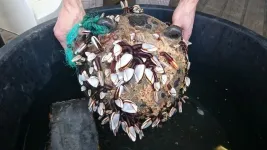(Press-News.org) Roughly two decades ago, a community-wide reckoning emerged concerning the credibility of published literature in the social-behavioral sciences, especially psychology. Several large scale studies attempted to reproduce previously published findings to no avail or to a much lesser magnitude, sending the credibility of the findings — and future studies in social-behavioral sciences — into question.
A handful of top experts in the field, however, set out to show that when best practices are employed, high replicability is possible. Over six years, researchers at labs from UC Santa Barbara, UC Berkeley, Stanford University and the University of Virginia discovered and replicated 16 novel findings with ostensibly gold standard best practices, including pre-registration, large sample sizes and replication fidelity. Their findings, published in Nature Human Behaviour, indeed suggest that with best practices, high replicability is achievable.
“It’s an existence proof that we can set out to discover new findings and replicate them at a very high level,” said UC Santa Barbara Distinguished Professor Jonathan Schooler, director of UCSB’s META Lab and the Center for Mindfulness and Human Potential, and senior author of the paper. “The major finding is that when you follow current best practices in conducting and replicating online social-behavioral studies, you can accomplish high and generally stable replication rates.”
Their study’s replication findings were 97% the size of the original findings on average. By comparison, prior replication projects observed replication findings that were roughly 50%.
The paper’s principal investigators were John Protzko of UCSB’s META Lab and Central Connecticut State University (CCSU), Jon Krosnick of Stanford’s Political Psychology Research Group, Leif Nelson at UC Berkeley’s Haas School of Business and Brian Nosek, who is affiliated with the University of Virginia and is the executive director of the standalone Center for Open Science.
“There have been a lot of concerns over the past few years about the replicability of many sciences, but psychology was among the first fields to start systematically investigating the issue,” said lead author Protzko, a research associate to Schooler’s lab, where he was a postdoctoral scholar during the study. He is now an assistant professor of psychological science at CCSU. “The question was whether past replication failures and declining effect sizes are inherently built into the assorted scientific domains that have observed them. For example, some have speculated that it is an inherent aspect of the scientific enterprise that newly discovered findings can become less replicable or smaller over time.”
The group decided to perform new studies using emerging best practices in open science — and then to replicate them with an innovative design in which the researchers committed to replicating the initial confirmation studies regardless of outcome. Over the course of six years, research teams at each lab developed studies which were then replicated by all of the other labs.
In total, the coalition discovered 16 new phenomena and replicated each of them 4 times involving 120,000 participants. “If you use best practices of large samples, pre-registration, open materials in the discovery of new science, and you run replications with as best fidelity to the original process as you can, you end up with a very highly replicable science,” Protzko said of the findings.
One key innovation the study offered was that all of the participating labs agreed to replicate the initial confirmation studies regardless of their outcome. This removed the scientific community’s customary bias of only publishing and replicating positive outcomes, which may have contributed to inflated initial assessments of effect sizes in the past. Furthermore, this approach enabled the researchers to observe several cases for which study designs that failed to produce significant findings in the original confirmation later attained reliable effects when replicated at other labs.
Across the board, the project revealed extremely high replicability rates of their social-behavioral findings, and no statistically significant evidence of decline over repeated replications. Given the sample sizes and effect sizes, the observed replicability rate of 86%, based on statistical significance, could not have been any higher, the researchers pointed out.
To test the novelty of their discoveries, they ran independent tests on people’s predictions regarding the direction of the new findings and their likelihood of replicability. Several follow-up surveys in which naïve participants evaluated descriptions of both the new studies and those associated with previous replication projects, found no differences in their respective predictability. Thus, the replication success of these studies was not due to them discovering obvious results that would necessarily be expected to replicate. Indeed, many of the newly discovered findings have already been independently published in high quality journals.
“It would not be particularly interesting to discover that it is easy to replicate completely obvious findings,” Schooler said. “But our studies were comparable in their surprise factor to studies that have been difficult to replicate in the past. Untrained judges who were given summaries of the two conditions in each of our studies and a comparable set of two-condition studies from a prior replication effort found it similarly difficult to predict the direction of our findings relative to the earlier ones.”
Because each research lab developed its own studies, they came from a variety of social, behavioral and psychological fields such as marketing, political psychology, prejudice, and decision-making. They all involved human subjects and adhered to certain constraints, such as not using deception. “We really built into the process that the individual labs would act independently,” Protzko said. “They would go about their sort of normal topics they were interested in and how they would run their studies.”
Collectively, their meta-scientific investigation provides evidence that low replicability and declining effects are not inevitable. Rigor enhancing practices can lead to very high replication rates, but exactly identifying which practices work best will take further study. This study’s “kitchen sink” approach — using multiple rigor-enhancing practices at once — didn’t isolate any individual practice’s effect.
Additional investigators on the study are Jordan Axt (Department of Psychology, McGill University of Montreal, Canada); Matt Berent (Matt Berent Consulting); Nicholas Buttrick (Department of Psychology, University of Wisconsin-Madison), Matthew DeBell (Institute for Research in Social Sciences, Stanford University), Charles R. Ebersole (Department of Psychology, University of Virginia), Sebastian Lundmark (The SOM Institute, University of Gothenburg, Sweden); Bo MacInnis (Department of Communication, Stanford University), Michael O’Donnell, (McDonough School of Business, Georgetown University); Hannah Perfecto (Olin School of Business, Washington University in St. Louis); James E. Pustejovsky (Educational Psychology Department, University of Wisconsin-Madison); Scott S. Roeder (Darla Moore School of Business, University of South Carolina); and Jan Walleczek (Phenoscience Laboratories, Berlin, Germany)
END
Social-behavioral findings can be highly replicable, six-year study by four labs suggests
2023-11-09
ELSE PRESS RELEASES FROM THIS DATE:
187 new genetic variants linked to prostate cancer found in largest, most diverse study of its kind
2023-11-09
A globe-spanning scientific team has compiled the most comprehensive list of genetic variants associated with prostate cancer risk — 451 in all — through a whole-genome analysis that ranks as the largest and most diverse investigation into prostate cancer genetics yet. The research, led by the USC Center for Genetic Epidemiology, the Keck School of Medicine of USC and USC Norris Comprehensive Cancer Center, and in the United Kingdom by The Institute of Cancer Research, London, included major increases in representation ...
The autism-linked gene SYNGAP1 could impact early stages of human brain development, USC study reveals
2023-11-09
The gene SYNGAP1, the variants of which are top risk factors for Autism Apectrum Disorder (ASD), has previously unappreciated effects on the developing brain, according to a new study published in Nature Neuroscience. The study shows how disease-causing variants of SYNGAP1, thought primarily to affect synapses between mature neurons, could disrupt early development in a key region of the brain known as the cortex.
“Our findings reframe our understanding ...
Almost half of people who use drugs in rural areas were recently incarcerated
2023-11-09
New research finds that almost half of people who use illicit drugs in rural areas have been recently incarcerated.
Results from a survey of almost 3,000 people in eight rural areas nationwide who report using illicit drugs published today in the journal JAMA Network Open. The study found that 42% had been incarcerated, either in prison or local jails, in the preceding six months.
The study was conducted by researchers at Oregon Health & Science University and institutions across 10 states.
The findings suggest a prime ...
Glow in the visible range detected for the first time in the Martian night
2023-11-09
An international team led by scientists from the University of Liège has observed, for the first time in the visible range, a glow on the night side of the planet Mars. These new observations provide a better understanding of the dynamics of the upper atmosphere of the Red Planet and its variations throughout the year.
A scientific team led by researchers from the Laboratory for Planetary and Atmospheric Physics (LPAP) at the University of Liège (BE) has just observed, for the first time, lights in the night sky over Mars using the UVIS-NOMAD instrument on ...
UChicago's Pritzker School of Molecular Engineering advances lithium-metal batteries, paving the way for safer, more powerful devices
2023-11-09
The boom in phones, laptops and other personal devices over the last few decades has been made possible by the lithium-ion (Li-ion) battery, but as climate change demands more powerful batteries for electric vehicles and grid-scale renewable storage, lithium-ion technology might not be enough.
Lithium-metal batteries (LMBs) have theoretical capacities an order of magnitude greater than lithium-ion, but a more literal boom has stymied research for decades.
“A compounding challenge that further doomed the first wave of LMB commercialization in the late 1980s was their propensity to ...
Sylvester research shows how interactions between tumor genes and microenvironment influence treatment response in multiple myeloma
2023-11-09
MIAMI, FLORIDA (EMBARGOED UNTIL NOV. 9, 2023, AT 11 A.M. ET) – A multicenter study led by researchers at Sylvester Comprehensive Cancer Center at the University of Miami Miller School of Medicine shows how interactions between tumor cells and immune components of the microenvironment can impact treatment responses and outcomes in patients newly diagnosed with multiple myeloma who undergo combination treatments that include targeted immunotherapy.
New drugs developed over the past two decades have dramatically improved survival rates, with “deep” and sustained treatment ...
Scientists caution against a reliance on mechanical devices to clear water bodies of plastic
2023-11-09
An international group of scientists has cautioned against reliance on mechanical cleanup devices as a means of addressing the plastic pollution crisis.
The researchers – comprising a number of the world’s foremost experts in plastic pollution – say they appreciate the clear and pressing need to tackle the millions of tonnes of waste that have already accumulated in the ocean and waterways.
However, they caution that plastic removal technologies used so far have shown varied efficiency in the amount of waste material they are able to collect, many have not been tested at all.
In fact, some have been shown to harm quantities of marine organisms – including ...
UTSA’s Jessica Eise wins funding to advance climate science advocacy research
2023-11-09
(San Antonio, November 9, 2023) — The National Science Foundation (NSF) has awarded Jessica Eise, an assistant professor of social and environmental challenges in the University of Texas at San Antonio Department of Communication, $425,000 for her project to explore how to create enduring change in environmental public behavior to support actions that will effectively address climate change and its impacts on society.
Despite four decades of climate change communication, the world has yet to see adequate public action and policymaker support to substantively address the challenge. Eise’s findings will empower ...
Women produce skin temperature data that are just as predictable as men
2023-11-09
Women produce physiological data that is just as predictable as men, at least when it comes to skin temperature. This might seem like common sense, but variations in body signals due to menstrual cycles, such as temperature, were used as an excuse to keep women out of clinical studies for decades.
The data for the finding was gathered from a wearable device to continuously monitor the skin temperature of 600 people, half female and half male, over six months.
The team found that there were more differences between any ...
Vanderbilt and Duke awarded Moore Foundation grant to improve oversight of AI technology in health care systems
2023-11-09
Vanderbilt University Medical Center (VUMC) and Duke University School of Medicine have been awarded a $1.25 million grant from the Gordon and Betty Moore Foundation for the project “Measuring Artificial Intelligence (AI) Maturity in Healthcare Organizations.”
Working with the Coalition for Health AI (CHAI) and the University of Iowa, a team of experts will leverage the grant to develop a maturity model framework. The project leads are Peter Embí, MD, MS, and Laurie Novak, ...







